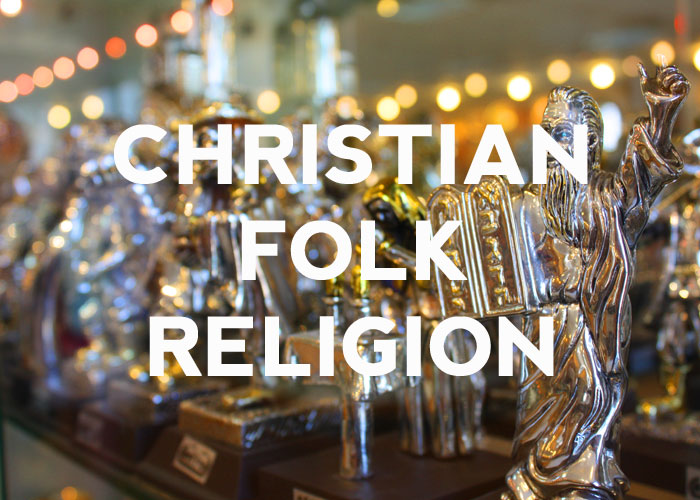CHRISTIAN FOLK RELIGION

Written by Bryan Laughlin on November 26, 2012
The Unseen Delusion
The interesting thing about folk religions is the ‘folk’ don’t realize they’ve bought into one. Folk religions are typically viewed as existing around the world in various contexts and countries, but rarely thought to exist in the West—much less in America. We tend to think in terms of varieties of genuine religious expressions, especially when it comes to the Christian faith. This sentiment is a bit naïve. It appears however that the validity of the Christian faith in America is more suspect than often noticed and would be better understood as a Christian folk religion, as something having the appearance of Christianity but actually something wholly different. Like a grand illusionist who puts on a great show, but in the end its merely smoke and mirrors lacking any real substance or reality.
Unfortunately like all folk religions, the difficulty in recognition is found in its subtlety. Folk religions are essentially a blend of formal religion and common culture. This is often referred to as syncretism. Syncretism distorts and redefines the formal religion usually resulting in a distinct religion from its original source. Although retaining much of the same terminology and practices, the meaning and significance are now representative of a completely new form of religion – a folk religion.
Facing the Delusion
This notion is a tough pill to swallow in America and in fact is typically rejected outright without reflection. The mere suggestion is seen as an act of lunacy. This is to be expected since the vast majority of Americans consider themselves to be Christians. A recent Gallup poll in 2012 discovered that 78% of Americans consider themselves to be Christians. Against such an overwhelming majority, suggesting that much if not most of this form of Christianity is merely a folk religion seems far-fetched. But then again most adherents to folk religions believe they are practicing the genuine faith. The lie is unseen since folk religion is a distortion of the original.
Knowing that formal or authentic Christianity does not rest on consensus, our discussion is not so easily put to rest. In order to get below the surface of the issue, the foundations must be exposed. A good doctor doesn’t confuse the symptoms for the disease. Sadly our analysis of Christianity in our culture endlessly gazes upon and muses over the mere symptoms without noticing its cancerous cause.
Returning to Authenticity
The proof of authenticity is found in the whether or not the beliefs, practices, and traditions actually line up with knowing Jesus and living for his kingdom.
So what is authentic Christianity? Although this would seem like a good place to start, it actually doesn’t go far enough. Many people today may be able to define formal Christianity, but Jesus’ focus goes further. Jesus wasn’t merely focused on helping people get their facts straight about God, but actually seeing their lives changed by him. So more appropriate question is, ‘What is authentic Christianity in you?’ Authentic Christianity is not merely an abstraction, but a faith that changes you completely. Attempts to divorce Christianity from real life miss the purpose of Jesus’ mission.
The expression of authentic Christianity can essentially be boiled down to knowing Jesus and living for his kingdom. It is true that any attempt at defining Christianity narrowly runs the risk of oversimplification. Even so when the full implications of knowing Jesus and living for his kingdom are grasped, we find ourselves in the midst of authentic Christianity. Broadly speaking this refers to an experiential knowledge of the person and work of Jesus coupled with a continual life lived for the purposes of his kingdom. This is a holistic faith, which means it is an embodied faith displayed in every aspect of one’s life.
This life of faith is reflected in the beliefs, practices, and traditions of an authentic faith community. The proof of authenticity is found in the whether or not the beliefs, practices, and traditions actually line up with knowing Jesus and living for his kingdom. This is how we are able to differentiate between authentic Christianity and Christian folk religion. Christian folk religion reveals itself not so much in what it affirms but in its denial of one of these essential elements of authentic Christianity. Consequently multiple expressions may be found in a particular culture.
Exposing the Expressions
Within America there are basically three expressions of Christian folk religion. There are those who understand ‘Life Without Jesus’, others who accept ‘Jesus Without Life’, and still others who follow ‘Another Jesus and Another Life’. Many who understand life without Jesus don’t necessarily believe Jesus is useless for life, but instead they don’t actually need him for anything in their lives. These are those who claim to be Christians and only look to Jesus as a good person to follow—merely a moral example of some kind. For these people, Jesus is just a role model like any other person in history. Essentially their lives consist in striving to live a good life before God and performing their religious duties in society. The church is viewed as a sustainer of traditional practices and religious rituals. This form of Christian folk religion is found in many mainline Protestant churches and Catholic churches today. In spite of the fact that much of their lives are morally upstanding, Jesus’ life is at best viewed as an inspiring story from history, or at worst, unnecessary altogether. An experiential knowledge of Jesus and authentic trust in his redemptive work on the cross for sins is tragically absent. Such people do not truly know Jesus.
Others in our culture want to affirm Jesus, yet somehow fail to realize the implications for their lives. These supposed lovers of the cross proclaim mightily that Jesus died for sins. “Repent and believe!” is their cry from every street corner in the city. And yet, their message is muddled by their mud-faced countenance. Hypocrisy is the justifiable charge. They are always telling others to repent and trust Jesus without ever repenting themselves. These people never follow Jesus. They constantly confuse the life that Jesus brings with a small set of rules conveniently crafted to fit their preferences. Like the Pharisees of old, their cup appears clean on the outside, but inside they are polluted to the core. This fundamentalist expression of Christian folk religion has the appearance of godliness but no power. True repentance in a life lived for Jesus the king is nowhere to be found. There is no regard for his kingdom in their lives. This folk religion is pervasive in conservative churches of all kinds, from conservative fundamentalist Baptist churches to independent Pentecostal and charismatic churches.
The final and subtlest of all Christian folk religions is unassumingly practiced in many evangelical churches in our country. Though the term evangelical in its truest sense accords with authentic Christianity, the current form promotes another life—one lived pursuing the American dream, not Jesus’ kingdom—and another Jesus—conjured up to serve their selfish desires, not Jesus’ desires to eradicate selfishness. Instead of love and obedience to Jesus as their one and only Lord and master, Jesus is reconstructed into a life coach, personal therapist, magic genie, or co-pilot who serves them. “Objection!” they cry at this point as they run to their confessions of faith covered in mounds of dust. But the dust has already settled, covering any sign of authentic Christianity.
The plague of Christian folk religion in our culture may appear overwhelming at times. Its pervasiveness and subtlety could lead us to question more than we should. The answer, as always, lies in the good news of Jesus. He is able to rescue us from our misguided folk religions. Jesus desires us to know him and experience the life of his kingdom, as we embrace authentic Christianity.
Bryan Laughlin is the lead pastor at Remnant Church in Richmond, VA, where he has served since its founding in 2009. He has a deep background in philosophy, but don’t hold that against him. At any given moment you can find Bryan with a book in one hand and a Diet Coke in the other. (Don’t hold that against him either.) Follow him on Twitter @bryanlaughlin.






